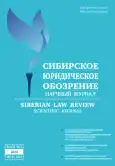Actual Problems of Development and Improvement of Constitutional Legislation (to the 30th Anniversary of the Constitution of the Russian Federation)
- Authors: Sevryugin V.E.1
-
Affiliations:
- Institute of State and Law, University of Tyumen
- Issue: Vol 21, No 2 (2024)
- Pages: 169-182
- Section: PUBLIC LEGAL (STATE LEGAL) SCIENCES
- Published: 21.10.2024
- URL: https://journal-vniispk.ru/2658-7602/article/view/348735
- DOI: https://doi.org/10.19073/2658-7602-2024-21-2-169-182
- EDN: https://elibrary.ru/FWRPLM
- ID: 348735
Cite item
Full Text
Abstract
The article analyzes the role and significance of the current Constitution of the Russian Federation. The analysis delves into both the merits and shortcomings of the approach, acknowledging initial limitations as well as those that emerged during subsequent development and structural reforms. The accumulated challenges over the thirty-year span of its operation underscore the necessity for reform and modernization of its norms to enhance constitutional law and legislation. Attention is drawn to the fact that the Constitution of the Russian Federation began to be subjected to meaningful and constructive criticism from the moment of its adoption as a document of the transition period. It is emphasized that advancing and refining national constitutional legislation is contingent upon drawing from progressive international practices and ensuring the preservation of social principles and traditional values inherent to its diverse populace. It is concluded that the provisions outlined in the Constitution of the Russian Federation serve as a fundamental component of the country's national security, providing legal assurance for the preservation of state sovereignty, independent domestic and foreign policies, as well as national and constitutional identity. The aim of this study is to argue for the imperative of comprehensive modernization of the Constitution of the Russian Federation. It seeks to formulate specific recommendations and proposals for the Federal legislature to address current gaps and contradictions in its legal framework. The examination of changes and additions to the current Constitution of the Russian Federation during the constitutional reforms of 2014 and 2020 has highlighted significant deficiencies in the content of several provisions within Chapters 1 and 2, which remain unchanged. This underscores the imperative for further reform, not only within the constitutional mechanisms governing the functioning of the state apparatus but also across all branches of government in Russia. In achieving the research goal, the author drew upon contemporary cognitive methods identified and refined by legal science, validated through practical application. The research methodology was founded on a materialistic interpretation of the fundamental laws governing the development of the state and society, alongside a conceptual analysis of legal reality. This approach facilitated a comprehensive exploration of the categorical understanding of constitutional law and legislation, revealing their intricacies in inseparable unity with other legal phenomena and categories. Throughout the research, a combination of specific scientific and specialized methods of cognition were employed, including formal logical reasoning, historical analysis, synthesis, abstraction, and modeling, among others.
About the authors
Viktor E. Sevryugin
Institute of State and Law, University of Tyumen
Author for correspondence.
Email: 7041945@mail.ru
ORCID iD: 0000-0003-2868-3678
ProfessorConsultant of the Department of Theoretical and Public Law Disciplines, Doctor of Legal Sciences, Professor, Honored Lawyer of the Russian Federation
Russian Federation, 6 Volodarsky st., Tyumen, 625003References
- Vasil’ev A. A. (Ed.). The Constitutional Principle of Ideological Diversity in the Russian Federation. Moscow: Yurlitform Publ.; 2017. 288 p. (In Russ.)
- Chebotarev G. N. Constitutional and Legal Mechanisms for Forming a Unified System of Public Power in the Russian Federation. Russian Juridical Journal. 2020;6:9-17. https://doi.org/10.34076/2071-3797-2020-6-9-17 (In Russ.)
- Avak’yan S. A. Constitutional Law and Politics: Problems of Interaction in the Modern World. In: Avak’yan S. A. (Ed.). Constitutional Law and Politics. Moscow: Yurist Publ.; 2012. P. 15-23. (In Russ.)
- Shakhrai S. M. Digital Constitution: Fundamental Rights and Freedoms of an Individual in a Totally Informational Society. Herald of the Russian Academy of Sciences. 2018;88(12):1075-1082. https://doi.org/10.31857/S086958730003185-1 (In Russ.)
- The Constitution of Russia for 10 years: the Experience of Implementation. Tyumen: Tyumen State University Publ.; 2003. 324 p. (In Russ.)
- Kleandrov M. I. On the Need for a New Constitution of the Russian Federation. Tyumen State University Herald. Social, Economic, and Law Research. 2021;7(4):139-151. https://doi.org/10.21684/2411-7897-2021-7-4-139-151 (In Russ.)
Supplementary files












